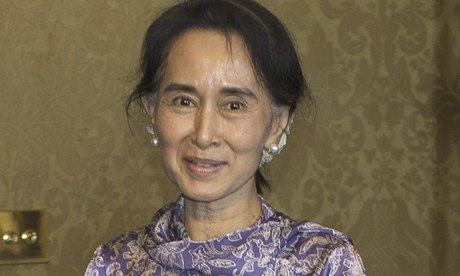Haroon Siddique
October 24, 2013.
Burmese opposition leader stops short of condemning anti-Muslim violence and insists no ethnic cleansing is taking place in Radio 4 interview
Aung San Suu Kyi is visiting Northern Ireland to discuss peace and reconciliation.
(Photograph: Wpa Pool/Getty Images)
Sectarian violence between Buddhists and Muslims began in western Rakhine state last year, with hundreds killed and about 140,000 people, mostly Muslims, driven from their homes. The violence has spread to other parts of the country this year. The government has been heavily criticised for not doing enough to protect Muslims, who account for about 4% of Burma's roughly 60 million people, and Aung San Suu Kyi has also been accused of failing to speak out.
In an interview broadcast on Thursday, the Nobel laureate insisted there was no ethnic cleansing taking place and said that both sides were afraid of each other.
"This problem arose last year and this is to do with fear on both sides," she told BBC Radio 4's Today programme. "The fear is not just on the side of the Muslims but also on the side of the Buddhists as well. Muslims have been targeted but also Buddhists have been subjected to violence … Global Muslim power is very great and certainly, that is a perception in many parts of the world and in our country as well."
Aung San Suu Kyi, who spent nearly 20 years under house arrest because of her opposition to the military government in Burma, is currently visiting the UK and is in Northern Ireland on Thursday to discuss peace and reconciliation.
During the interview she was asked to condemn Wirathu, a Buddhist monk dubbed the "Burmese Bin Laden" who has been stoking hatred against Muslims, denouncing them as "crude and savage". She replied: "I condemn hatred of any kind." Similarly, she was asked to condemn violence against Muslims and answered: "I condemn any movement that is based on hatred and extremism."
Muslims have been the main victims since the violence began in western Rakhine state last year, but so far most criminal trials have involved prosecutions of Muslims, not members of the Buddhist majority.
Anti-Muslim sentiment is closely tied to nationalism and the dominant Buddhist religion, making leaders reluctant to speak up.
Aung San Suu Kyi showed frustration with her interviewer at the number of questions about the violence. "I would say instead of asking us members of the opposition what we feel about it, what we intend to do about it … you should ask the present government of Burma what their policy is," she said.
Read original article here.
*****
Comment: Aung San Suu Kyi is being disingenuous and duplicitous.It is very clear that she cares more for her political future than confronting the truth about the genocide being waged against the Rohingya or the suppression of Muslims in general.
See related PressTv video here.
I remember during apartheid apologists would often use the same constructed argument.
Making Muslims and hardline Buddhists - who are supported by the government - equal partners in the sectarian violence is akin to blaming black people for apartheid.
Onward!

No comments:
Post a Comment